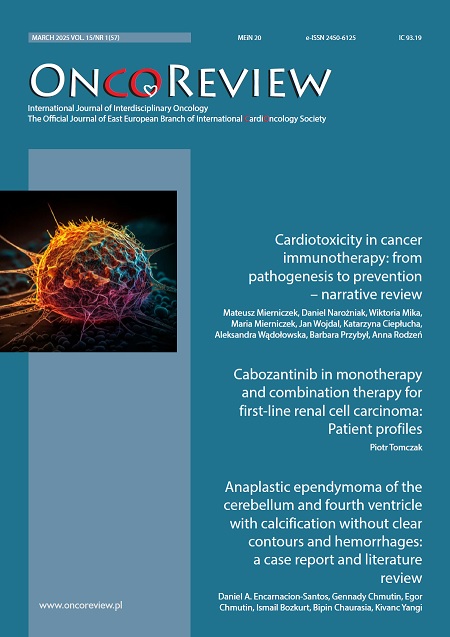Cardiotoxicity in cancer immunotherapy: from pathogenesis to prevention ? narrative review Review article
Main Article Content
Abstract
Cancer immunotherapies, such as immune checkpoint inhibitors and chimeric antigen receptor T-cell therapy, improve survival but carry a risk of severe cardiotoxicity. Myocarditis is the most dangerous complication with high mortality, and its mechanism involves T-cell auto-aggression or cytokine storms. Risk management requires vigilance, monitoring of cardiac biomarkers, and imaging studies. Prompt treatment with high-dose glucocorticosteroids is crucial. Collaboration within cardio-oncology teams is fundamental for safety, and further research must focus on precise risk stratification to protect patients while maintaining therapeutic efficacy.
Downloads
Article Details

This work is licensed under a Creative Commons Attribution-NonCommercial 4.0 International License.
Copyright: ? Medical Education sp. z o.o. This is an Open Access article distributed under the terms of the Attribution-NonCommercial 4.0 International (CC BY-NC 4.0). License (https://creativecommons.org/licenses/by-nc/4.0/), allowing third parties to copy and redistribute the material in any medium or format and to remix, transform, and build upon the material, provided the original work is properly cited and states its license.
Address reprint requests to: Medical Education, Marcin Kuźma (marcin.kuzma@mededu.pl)
References
2. Brahmer JR, Lacchetti C, Schneider BJ et al. Management of immune-related adverse events in patients treated with immune checkpoint inhibitor therapy: American Society of Clinical Oncology clinical practice guideline. J Clin Oncol. 2018; 36(17): 1714-68. http://doi.org/10.1200/JCO.2017.77.6385.
3. Nishimura H, Honjo T. PD-1: an inhibitory immunoreceptor involved in peripheral tolerance. Trends Immunol. 2001; 22(5): 265-8. http://doi.org/10.1016/s1471-4906(01)01888-9.
4. Zhou F, Chen Z, Zhou C et al. Cardiotoxicity in cancer immunotherapy: a systematic review and global meta-analysis. J Transl Med. 2025; 23: 718. http://doi.org/10.1186/s12967-025-06768-w .
5. Patel NP, Doukas PG, Gordon LI et al. Cardiovascular toxicities of CAR T-cell therapy: a review of clinical studies. Curr Treat Options Cardiovasc Med. 2021; 23(6): 44. http://doi.org/10.1007/s11912-021-01068-0.
6. Hu JR, Florido R, Lipson EJ et al. Cardiovascular toxicities associated with immune checkpoint inhibitors. Cardiovasc Res. 2019; 115(5): 854-68. http://doi.org/10.1093/cvr/cvz026.
7. Salem JE, Manouchehri A, Moey M et al. Cardiovascular toxicities associated with immune checkpoint inhibitors: an observational, retrospective, pharmacovigilance study. Lancet Oncol. 2018; 19(12): 1579-89. http://doi.org/10.1016/S1470-2045(18)30608-9.
8. Du H, Wang J, Wang Z. Cardiovascular adverse effects of immunotherapy in cancer: insights and implications. Front Oncol. 2025; 15: 1601808. http://doi.org/10.3389/fonc.2025.1601808.
9. Chitturi KR, Xu J, Araujo-Gutierrez R et al. Immune checkpoint inhibitor-related adverse cardiovascular events in patients with lung cancer. JACC CardioOncol. 2019; 1(2): 182-92. http://doi.org/10.1016/j.jaccao.2019.07.003.
10. Ganatra S, Neilan TG. Immune checkpoint inhibitor-associated myocarditis. Oncologist. 2018; 23(8): 879-86. http://doi.org/10.1634/theoncologist.2018-0130.
11. Palaskas N, Lopez-Mattei J, Durand JB et al. Immune Checkpoint Inhibitor Myocarditis: Pathophysiological Characteristics, Diagnosis, and Treatment. J Am Heart Assoc. 2020; 9(2): e013757. http://doi.org/10.1161/JAHA.119.013757.
12. Mahmood SS, Fradley MG, Cohen JV et al. Myocarditis in patients treated with immune checkpoint inhibitors. J Am Coll Cardiol. 2018; 71(16): 1755-64. http://doi.org/10.1016/j.jacc.2018.02.037.
13. Chen B, Dai H, Wang H et al. The cardiac-related adverse events of PD-1/PD-L1 immunotherapy in advanced or metastatic lung cancer: a RCT-based meta-analysis. Support Care Cancer. 2024; 32(2): 140. http://doi.org/10.1007/s00520-023-08062-1.
14. Wang DY, Salem JE, Cohen JV et al. Fatal toxic effects associated with immune checkpoint inhibitors: a systematic review and meta-analysis. JAMA Oncol. 2018; 4(12): 1721-8. http://doi.org/10.1001/jamaoncol.2018.3923.
15. Johnson DB, Balko JM, Compton ML et al. Fulminant myocarditis with combination immune checkpoint blockade. N Engl J Med. 2016; 375(18): 1749-55. http://doi.org/10.1056/NEJMoa1609214.
16. Moslehi JJ, Salem JE, Sosman JA et al. Increased reporting of fatal immune checkpoint inhibitor-associated myocarditis. Lancet. 2018; 391(10124): 933. http://doi.org/10.1016/S0140-6736(18)30533-6.
17. Jiménez-Alejandre R, Ruiz-Fernández I, Martín P. Pathophysiology of immune checkpoint inhibitor-induced myocarditis. Cancers (Basel). 2022; 14(18): 4494. http://doi.org/10.3390/cancers14184494.
18. Otto SM, Martinez AL, Dains JE. Risk factors for immune checkpoint inhibitor?related myocarditis: an integrative review. J Adv Pract Oncol. 2024; 15(2): 111-23. http://doi.org/10.6004/jadpro.2024.15.2.4.
19. Escudier M, Cautela J, Malissen N et al. Clinical features, management, and outcomes of immune checkpoint inhibitor-related cardiotoxicity. Circulation. 2017; 136(21): 2085-7. http://doi.org/10.1161/CIRCULATIONAHA.117.030571.
20. Gilon D, Iakobishvili Z, Leibowitz D. The Diagnosis and Management of Immune Checkpoint Inhibitor Cardiovascular Toxicity: Myocarditis and Beyond. Vaccines (Basel). 2022; 10(2): 304. http://doi.org/10.3390/vaccines10020304.
21. Waliany S, Neal JW, Reddy S et al. Myocarditis surveillance with high-sensitivity troponin I during cancer immunotherapy. JACC CardioOncol. 2021; 3(1): 137-9. http://doi.org/10.1016/j.jaccao.2020.12.010.
22. Moslehi JJ, Salem JE. Immune checkpoint inhibitor myocarditis: treatment strategies and future directions. JACC CardioOncol. 2022; 4(5): 800-3. http://doi.org/10.1016/j.jaccao.2022.07.002.
23. Pardoll DM. The blockade of immune checkpoints in cancer immunotherapy. Nat Rev Cancer. 2012; 12(4): 252-64. http://doi.org/10.1038/nrc3239.
24. Brahmer JR, Tykodi SS, Chow LQ et al. Safety and activity of anti?PD-L1 antibody in patients with advanced cancer. N Engl J Med. 2012; 366(26): 2455-65. http://doi.org/10.1056/NEJMoa1200694.
25. Maude SL, Frey N, Shaw PA et al. Chimeric antigen receptor T cells for sustained remissions in leukemia. N Engl J Med. 2014; 371(16): 1507-17. http://doi.org/10.1056/NEJMoa1407222.
26. Brudno JN, Kochenderfer JN. Toxicities of chimeric antigen receptor T cells: recognition and management. Blood. 2016; 127(26): 3321-30. http://doi.org/10.1182/blood-2016-04-703751.
27. Lyon AR, López-Fernández T, Couch LS et al. 2022 ESC guidelines on cardio-oncology developed in collaboration with the European Hematology Association (EHA), the European Society for Therapeutic Radiology and Oncology (ESTRO) and the International Cardio-Oncology Society (IC-OS). Eur Heart J. 2022; 43(41): 4229-61. http://doi.org/10.1093/eurheartj/ehac244.
28. Schneider BJ, Naidoo J, Santomasso BD et al. Management of immune-related adverse events in patients treated with immune checkpoint inhibitor therapy: ASCO guideline update. J Clin Oncol. 2023; 41(34): 5315-35. http://doi.org/10.1200/JCO.23.0094.
29. Braghieri L, Gharaibeh A, Nkashama L et al. Long-term cardiovascular outcomes of immune checkpoint inhibitor-related myocarditis: a large single-centre analysis. ESC Heart Fail. 2024; 12(2): 1237-45. http://doi.org/10.1002/ehf2.14560.

